- Home
- Janice Kay Johnson
For the Girls' Sake Page 2
For the Girls' Sake Read online
Page 2
"He’s got Type O, you know," she said, "and we’re terribly short."
Lynn had said helpfully, "My blood is O, too," and she’d promised she would ask Brian, but she’d definitely come down to the blood bank herself. She had, and he must have, too, after work, not romantically together this time. That part didn’t matter; what did was that the blood bank had specifically wanted him to come in because he had O.
Instead of going to bed, Lynn felt her way back along the narrow hall to the kitchen, with its tiny refrigerator so old she had to regularly defrost the freezer part, the linoleum with the pattern worn to a blur, the brand-new shiny white stove, bought when the old one gave up the ghost at the worst possible moment, the way it always went. In the brightness when she switched on the light, the cheery yellow she’d painted the cabinets looked garish, a disguise as obvious as a clown’s red nose.
The living quarters of the house were crummy; she’d put all her money into the downstairs, the bookstore. She’d had to. She and Shelly could make do, Lynn had told herself. Until the store became more profitable. If it ever did.
But now she couldn’t help looking around and imagining what other people would think. If, for example, Shelly’s real, biological parents were trying to take her back.
I wouldn’t look very good, would I? Lynn thought. Her knees crumpled, and she sank onto one of the two mismatched chairs that went with the tiny, scarred Formica and metal kitchen table. I don’t have much to offer Shelly materially, and I’m divorced, and my ex-husband thinks I must have cheated on him.
Those other parents, they could take Shelly away from her. She remembered a photo from some horrible child custody case, when the little boy was screaming and reaching for the only parents he’d ever known while the biological father carried him away. How painfully easy it was to transpose faces: she was the one trying to be brave, make this seem like the right thing, while Shelly was ripped away from her like one of the beautiful sea stars from a slick wet rock.
Oh no, oh no, oh no.
She drew up her knees and hugged herself and shook, panting for breaths. She could hear herself gasping. She must be in shock, she felt so strange. Cold, and frightened, as if an intruder had crept in and attacked her, as if she would never feel safe again.
Nobody must ever know. That was her only hope. Nobody. Ever.
Eventually the shaking passed, and she saw again her kitchen, tidy and spotlessly clean, however shabby, and on the refrigerator Shelly’s bright crayon drawings that were supposed to be sea stars or seals or horses, those inner imaginings that her short fingers were not yet capable of rendering. It was home: loving, safe, clean and ordered. What else mattered? Certainly not money.
Nor blood. She didn’t care whose ran through Shelly’s veins. She would never let it matter.
But first, she had to be sure.
The blue plastic clock on the wall said eight-thirty. Not too late to call Brian’s mother.
Ruth Schoening’s voice held caution, once she knew who was on the phone.
"Lynn. My, it’s late in the evening to be calling."
Not: Oh, gracious, Shelly is all right, isn’t she?
Lynn noticed the lack, and decided on honesty. "Brian’s told you he doesn’t think Shelly is his daughter, hasn’t he?"
The pause resonated with awkwardness. "He did say something."
"I would never..." The automatic denial caught in Lynn’s throat. She might someday have to claim she had. She took a breath. "You don’t believe that, do you?"
Really, she was begging, You know me. Please say that you have faith in me, that you love Shelly no matter what.
"It’s not really my business," her ex-husband’s mother said, the constraint in her voice obvious.
"She’s your granddaughter."
"Is she?"
She had begun to shake again, Lynn noticed with peculiar detachment. "This is so ridiculous," she exclaimed, trying to laugh and failing.
"I hope so," Ruth said. "But, you know, he’s right—Shelly doesn’t look like anybody in the family."
"When my grandmother was a little girl..."
"Brian said he’d looked through your family album, and Shelly doesn’t look like anybody on your side, either. She’s so...so dark, and with that pointy chin she makes me think of, oh, a pixie from a fairy tale. My children were round and sturdy and blond. Like little Swedes."
She always said that as if Swedish children were fairer than any other kind. She never addressed the fact that Schoening was a German name, not Scandinavian.
Obviously, there would be no assurances of unfailing love no matter what. Shelly would lose her grandparents, too, if it came to that.
"Well," Lynn said, "the reason I’m calling is that I’m considering having Shelly tested so we can lay this foolishness to rest. It makes me mad to have to subject her to needles and all that scariness, but I might do it. So what I wondered is, do you remember what Brian’s blood type is?"
"Oh, yes," his mother said promptly. "He’s O positive, just like me. What a good idea, Lynn! Doubts should always be laid to rest, don’t you think?"
Fury kindled in her breast. Now that she’d gotten what she wanted, she let anger have its rein, sharpening her voice. "What I think is that all this is incredibly insulting. I understand that Brian’s still angry about our divorce, but you know me better than to believe this...this hogwash. You claim to love Shelly. You always say I should bring her for visits more often, that she’s adorable, that I should send pictures so you can show all your friends, and now you talk about her as if she’s tainted and you’ve always known something was wrong with her. She’s...she’s a bright, beautiful child whose eyes don’t happen to be blue. Well, I’m not Swedish, and I don’t expect my daughter to look like she is!" Lynn ended with a snap. "That’s what I think."
She didn’t wait for a response. She hung up the telephone in a righteous rage that deserted her too quickly. How could she get mad, when Shelly wasn’t Brian’s daughter? Maybe she was the one who was blind! Maybe she should have realized immediately that something was wrong, that the baby the nurses handed her was a changeling.
But she hadn’t, oh, she hadn’t. Instead, the connection had been deep and instant, a mother’s love for this child and only this one.
Well, the fierceness of her love hadn’t diminished. She would tell Brian that she wasn’t going to get Shelly tested, and if he cut his daughter off, so be it. She would let him live with a creeping feeling of shame. It would serve him right.
She stood up, as wearily as if she’d just overcome a violent bout of flu, and turned off the kitchen light, using the glow from the bathroom to find her way to her bedroom.
Life might get harder; Shelly would be hurt that her father didn’t want her. But no one must ever know.
* * *
THE DREAM CAME EVERY NIGHT from then on. She was searching desperately for someone. For her little girl. First she was on the beach, and she’d been reading her mail, and the fog had rolled in, and she looked up suddenly and realized she couldn’t see her.
"Shelly!" she began crying. "Shelly, where are you?" She leaped to her feet and spun in every direction, crying over and over, "Shelly!"
She began stumbling toward the water. Boulders reared from nowhere, tripping her. The roar of the surf filled her ears, and she knew with sickening certainty that Shelly had been caught by a wave.
But, no, she wasn’t on the beach at all. She was in a city, although the fog still played tricks with her eyes. The sound was from traffic. Oh, no! How could she have looked away, even for a moment? The sea was merciless, but cars were deadly.
She searched the sidewalks frantically for a bright chestnut head. People passing ignored her. Then she saw her, out on the median, cars racing by without slowing at all for the toddler who teetered there. She wore rags; she looked like Cosette in Les Misérables, wretched and unwanted. Brimming with tears, her bright blue eyes met Lynn’s momentarily through a break in the traffic, but wit
hout recognition.
My daughter doesn’t know me, Lynn realized with horror.
"Stay where you are!" Lynn screamed. "Wait! I’m coming!"
But her voice meant nothing to this child, and with greater shock Lynn discovered she didn’t know her own daughter’s name.
Sobbing, the little girl stepped from the curb.
And Lynn awakened, as she did every night, her screamed "No!" trembling on her lips and tears running down her cheeks.
With a moan she curled into a ball and shuddered. At last she went into the bathroom and splashed cold water on her face, then stared hopelessly at herself in the mirror.
Of course she was having dreams; their content was hardly subtle.
Somewhere out there was another little girl, one she’d carried in her womb. How many promises she’d made to that baby as she dreamed of the future! She sang to her and laughed and tickled her own belly when a tiny toe or elbow surfaced. She played music and danced and read aloud, just so her child would know her voice, would know she was loved.
But, through no fault of her own, she hadn’t kept those promises. Her baby had never heard her voice again. Someone else had taken her home. Did these other parents love her and sing to her and tickle her toes? Or had she gone home with a teenager who hadn’t really wanted to get pregnant? Perhaps she was in a foster home, or had an angry father who shook her when she wouldn’t quit crying. What if she was slow to develop, but nobody was patient? Or what if they loved her, these parents, but they were raising her the only way they knew how, by spanking her when she got cranky or broke something, by screaming at her with the anger of their own childhoods in their voices?
"If only..." Lynn breathed soundlessly. If only she could know. See that this other little girl was loved and cared for, read to and hugged, that her artwork was on the refrigerator for all to admire.
If she knew, the dreams would go away.
But how could she ever find out without contacting the hospital and telling them? Without taking the chance of losing Shelly?
That was the torment. Risk the little girl who was the center of her life, who meant everything to her, for the sake of one who couldn’t possibly remember her voice. Who would have forgotten her songs and the stories she’d promised to finish someday, when they could giggle together.
She crept down the hall like a ghost to her daughter’s room, hovering in the doorway because the bed nearly filled the space, which in a house of this era had probably been meant as a sewing room or a nursery. Sunny yellow and black cats frolicked among sunflowers on the wallpaper that climbed the slanted ceiling. Yellow curtains covered the tall sash window. Under a pale lemon-yellow and white comforter, Shelly slept peacefully. Lynn could just make out her face in the glow from the hall, and thought, Ruth is right. She looks like a Celt from old stories, a fairy child, with that small, pointy chin, that high curving forehead and glossy brown hair as straight as promises that were kept.
Risk her, for the dream child?
Lynn closed her eyes on a soft, agonized exhalation. How could she?
How could she not?
CHAPTER TWO
LATE AGAIN.
Adam Landry swore at the driver of the car in front of him, which hesitated just too long and missed the one and only opening to make a left turn before the light became red.
Good grief, he thought bitterly. They’d both be sitting through another full light. And he was already—he snatched an edgy look at the clock on his dash—ten minutes past the closing of his daughter’s preschool.
This was getting to be routine, and if he wasn’t careful they’d ask him to make other arrangements for Rose. But the Cottage Path Preschool and Day Care was the best.
Oh, why lie to himself? He didn’t know if it was best. He didn’t know a thing about it, except that Jennifer had chosen it, an eternity ago when she was pregnant and joyful, not planning to go back to work but figuring she’d need a place for drop-in sometimes.
Over dinner, she’d told him about it, her eyes sparkling with pleasure. "It’s the Cottage Path Preschool. Isn’t that perfect? Can you believe it? Our Rose will trip up the path to the cottage. Oh!" She’d shivered in delight, and he’d momentarily seen the vision that had become the center of her life: a little girl with the same mahogany brown hair as her mommy, her legs skinny, dimples flashing and her giggle a trill like a flute solo that reached for the sky and found it.
Their child.
And him? What had he said? A gruff "You’re not letting the name of the place suck you in, are you?"
She’d only laughed at him, her joy undimmed. "Don’t be silly. It’s a wonderful preschool! The director’s written a book about early childhood development. They have animals—chickens and goats and this big lazy dog that lets kids climb all over him and only grunts. And puzzles and books and blocks and puppets! It’s wonderland."
Pain stabbed now and Adam rubbed his chest. He’d never considered anyplace else for Rose. He was trying to raise their daughter as Jennifer would have wanted to, which meant he scraped his memory for nuggets his wife might have dropped, perhaps in bed when he scanned the financial news a last time while she chattered on in her light voice as if oblivious to his lack of attention.
Adam took another savage look at the clock and groaned. Was he messing up one more thing Jennifer had wanted for Rose?
But maybe it wasn’t the best choice now. Maybe he should go for a nanny.
He tensed when the light turned green and willed the driver of the Buick to make a dash before cross-traffic began. But, no. The car didn’t even inch forward. The heel of Adam’s hand was on the horn when he clenched his teeth and made himself wrap his fingers around the wheel again. If he hadn’t stayed for that last phone call, he wouldn’t be in such a hurry he wanted other drivers to take their lives in their hands just to get out of his way. Why hadn’t he walked out, ignored the ringing?
He couldn’t do everything.
He had to try. He owed it to Rose. And to Jennifer.
An interminable five more minutes had passed before he barreled into the parking lot, yanked on the emergency brake and killed the engine, slamming his door before he strode in.
The director of the preschool, a woman of his own age named Melissa Gearhart, waited in the entry, eyes cool.
"Mr. Landry. Rose has been worried."
His intense anxiety made itself felt in a long huff of breath. "I’m sorry. I’ve done it again."
"I’m afraid I’m going to have to start charging you when staff has to stay late, like today."
"I understand." He swallowed. "Where’s Rose?"
The dark-haired woman with tired smudges beneath her eyes turned. "Under the climber."
He stepped past her into the main activity room, where the floor was covered with bright mats to pad falls from the slide and wooden peg climber. He had to circle a playhouse before he saw his daughter, lying on the mat with her thumb in her mouth.
Wearing clothes he’d never seen before. Ill fitting and mismatched.
"She had an accident again," Melissa said softly behind him. "No big deal. I’ve got her clothes in a plastic bag for you. Just bring those back when you’ve washed them."
He closed his eyes for a moment, acknowledging more failure. Or maybe not—he hadn’t had the guts to ask the mothers who picked up their three-year-olds whether they had potty accidents still, too. Or the occasional father, none exclusive parents the way he was. Adam didn’t even like to ask Melissa, because he didn’t want to know something was wrong, that he’d already warped his beloved child.
If only he knew what on earth he was doing.
If only Jennifer were alive to help him do it.
"Hey, Rose Red," he said softly, crouching. "Ready to bloom?"
"Daddy!" She erupted to her feet and into his arms, her sky-blue eyes flooding with tears. "You’re late, and I’m hungry, and I had a accident, an’..."
He stemmed the flow. "I’m sorry, I’m sorry. Here you were, all
by yourself."
"Except for Lissa," Rose mumbled against his shoulder. She snuffled. "Lissa didn’t leave me."
He felt the crushing addition, Like you do. Every day.
She’d taken lately to holding on to him and screaming when he tried to drop her off in the morning. He felt like the worst parent in the whole world when the day-care workers had to pry his daughter’s fingers off him and haul her away, when the last thing he saw was Rose’s round tear-streaked face. Those desperate, pleading eyes haunted his days, gave him a feeling of self-loathing.
But, he had to work!
Rationally he knew that other kids cried in the morning, too, that it was probably just a stage. Reason didn’t quell the guilt that ate at his gut like too many cups of coffee.
She needed her daddy, and he wasn’t there.
He hustled her out to the car, belatedly grabbing the white plastic garbage sack that held Rose’s own clothes. That meant laundry tonight. He didn’t want to leave these for Ann, their twenty-something housekeeper-cook. When Rose wet the bed, he always changed it, too. Three and a half wasn’t so old, he tried to tell himself, but he hadn’t seen those discreet plastic bags go home with Rose’s friends Rainy and Sylvie, either. Not in months.
His daughter fell asleep during the drive home, worn out by a ten-hour day, and more guilt stabbed him. Poor Rosebud. How did a little girl grow into a woman without a mother to lead the way? What did he know about girlish secrets or adolescent crushes or makeup or menstrual cramps?
Well, he’d just have to learn. He was mommy and daddy both, determined not to foist his daughter’s upbringing on a series of nannies. Jennifer wouldn’t have wanted that.
I didn’t mean it, he said silently, speaking to her as if she were listening. No nanny.
A nanny would be a replacement. A substitute mother. No one could be Jennifer, petite, quick moving, eternally optimistic, alive.
Dead, in every meaningful way, long before her daughter was cut from her belly.

 Home Deadly Home
Home Deadly Home From Father to Son
From Father to Son All the Lost Little Horses (A Desperation Creek Novel Book 2)
All the Lost Little Horses (A Desperation Creek Novel Book 2) Hide the Child
Hide the Child Within Range
Within Range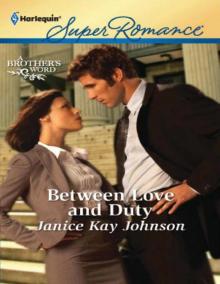 Between Love and Duty
Between Love and Duty First Comes Baby
First Comes Baby Charlotte's Homecoming
Charlotte's Homecoming In A Heartbeat (HQR Superromance)
In A Heartbeat (HQR Superromance)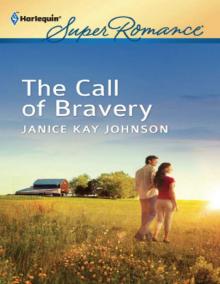 The Call of Bravery
The Call of Bravery In Hope's Shadow
In Hope's Shadow Anything for Her
Anything for Her Harlequin Superromance September 2014 - Bundle 1 of 2: This Good ManPromises Under the Peach TreeHusband by Choice
Harlequin Superromance September 2014 - Bundle 1 of 2: This Good ManPromises Under the Peach TreeHusband by Choice The Baby Agenda
The Baby Agenda More Than Neighbors
More Than Neighbors Her Amish Protectors
Her Amish Protectors All That Remains
All That Remains Whisper of Revenge (A Cape Trouble Novel Book 4)
Whisper of Revenge (A Cape Trouble Novel Book 4) In a Heartbeat
In a Heartbeat A Mother's Claim
A Mother's Claim Because of a Girl
Because of a Girl Back Against the Wall
Back Against the Wall Dangerous Waters
Dangerous Waters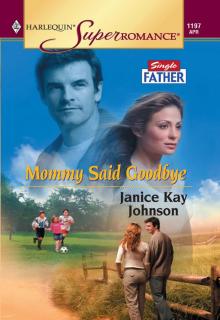 Mommy Said Goodbye
Mommy Said Goodbye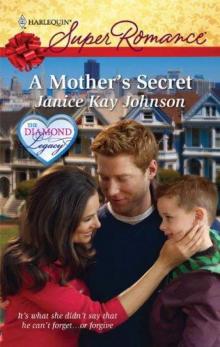 A Mother's Secret
A Mother's Secret See How She Runs (A Cape Trouble Novel Book 2)
See How She Runs (A Cape Trouble Novel Book 2) Plain Refuge
Plain Refuge Bringing Maddie Home
Bringing Maddie Home For the Girls' Sake
For the Girls' Sake Through the Sheriff's Eyes
Through the Sheriff's Eyes Yesterday's Gone (Two Daughters Book 1)
Yesterday's Gone (Two Daughters Book 1) All a Man Is
All a Man Is Harlequin Superromance January 2014 - Bundle 1 of 2: Everywhere She GoesA Promise for the BabyThat Summer at the Shore
Harlequin Superromance January 2014 - Bundle 1 of 2: Everywhere She GoesA Promise for the BabyThat Summer at the Shore No Matter What
No Matter What Wakefield College 01 - Where It May Lead
Wakefield College 01 - Where It May Lead Someone Like Her
Someone Like Her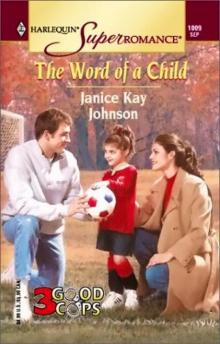 THE WORD OF A CHILD
THE WORD OF A CHILD Harlequin Superromance May 2016 Box Set
Harlequin Superromance May 2016 Box Set Open Secret
Open Secret The New Man
The New Man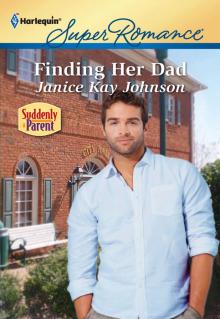 Finding Her Dad
Finding Her Dad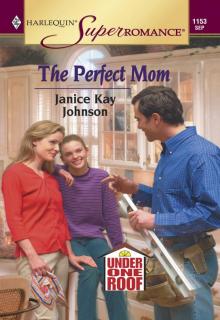 The Perfect Mom
The Perfect Mom All Through The House
All Through The House Match Made in Court
Match Made in Court Making Her Way Home
Making Her Way Home From This Day On
From This Day On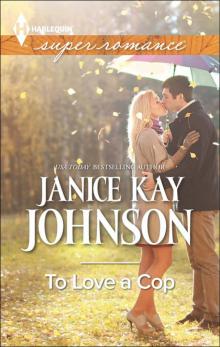 To Love a Cop
To Love a Cop The Hero's Redemption
The Hero's Redemption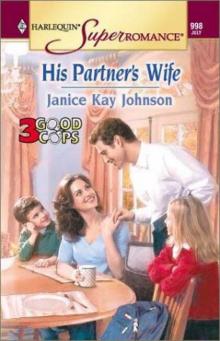 HIS PARTNER'S WIFE
HIS PARTNER'S WIFE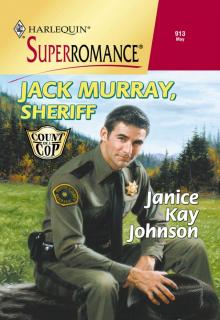 Jack Murray, Sheriff
Jack Murray, Sheriff Dead Wrong
Dead Wrong Twisted Threads (A Cape Trouble Novel Book 3)
Twisted Threads (A Cape Trouble Novel Book 3) Bone Deep
Bone Deep The Closer He Gets
The Closer He Gets With Child
With Child Whose Baby?
Whose Baby? Kids by Christmas
Kids by Christmas